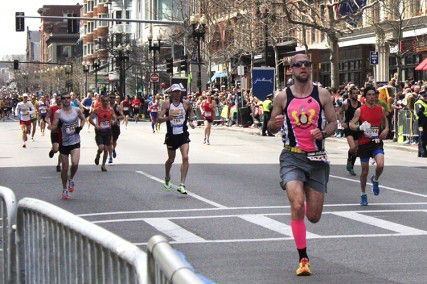
On April 15, almost everyone in Boston became a runner. When two bombs exploded at the finish line of the Boston Marathon, many organizers and residents said they wanted the 2014 Boston Marathon to be the biggest and best yet as a sign of hope.
They may yet get that chance, as on Aug. 29, the Boston Athletic Association announced a 9,000-runner increase in field size for the 2014 marathon.
The BAA is capping the field size at 36,000 participants, an increase from the 2013 Boston Marathon’s cap of 27,000 runners, but it does not surpass the record of 38,708 entrants set at the Centennial Boston Marathon in 1996.
Wayne Levy, a guide for RunBoston and member of the BAA, said the 2013 Boston Marathon changed everyone’s outlook on running and what running means to people.
“I absolutely think there will be renewed interest [in the marathon] … everyone I’ve spoken to is excited about running this year,” he said. “That’s why the BAA had to expand the total numbers to an additional 9,000.”
The two April explosions killed three people and wounded more than 260.
Registration for the race will open on Sept. 9 at 10 a.m. for people who have beat their qualifying times by more than 20 minutes for their age group, according to a release from the BAA on Aug. 29.
The remaining participants will register on a rolling admission, with those who qualified by more than 10 minutes on Sept. 11. If spaces remain, they will open on Sept. 12 and Sept. 13 for those who met their qualifying times.
“The BAA is aware of the significantly increased interest in registering for the 2014 Boston Marathon,” said Tom Grilk, executive director of the BAA, in the release. “The rolling admission schedule will provide runners with the fastest qualifying times in their age and gender group the ability to have their entry accepted in an orderly and systematic manner.”
Thousands of runners who did not get a chance to finish the race due to this years Boston marathon bombing have signed up for the 2014 race early in a special registration period for runners who reached the halfway mark and were not able to finish. Those 5,624 runners were contacted by the BAA via email and over 4,500 responses were received, according to the release.
Levy said the special registration for runners who did not get a chance to complete the race was the right call.
“I think it’s great and the right call to allow those individuals to come back and run,” he said. “They were robbed from finishing and worked very hard by physically training and fundraising … this is an opportunity for them to come back and do finish what they started.”
Jennifer Carter-Battaglino, area director of Kilachand Hall who teaches a marathon training class at Boston University, said the 2014 Boston Marathon will be a time for both celebration and for remembrance.
“The marathon is an opportunity for people from around the world to come together and celebrate,” she said. “It is a tradition in Boston for runners as well as spectators and is one of the most popular marathons in the country. I think it is important to many this year because of the events that occurred during last year’s marathon.”
Because of the bombings, public safety officials have worked with the City of Boston to bring the field size up to 36,000 while still focusing on safety at the race, according to the release.
Elliot Lehane, a graduate from Boston University who ran track and cross-country, said the marathon would be the most emotional yet.
“The attack was one of those things that leaves a scar on the event and every single patriots day people will think about … but like a physical scar it will begin to fade as the years go on,” he said. “There’s a lot of pride and measurable willpower that runners have, and that will be felt in this years marathon. People will want to be a part of that.”
This is an account occasionally used by the Daily Free Press editors to post archived posts from previous iterations of the site or otherwise for special circumstance publications. See authorship info on the byline at the top of the page.













